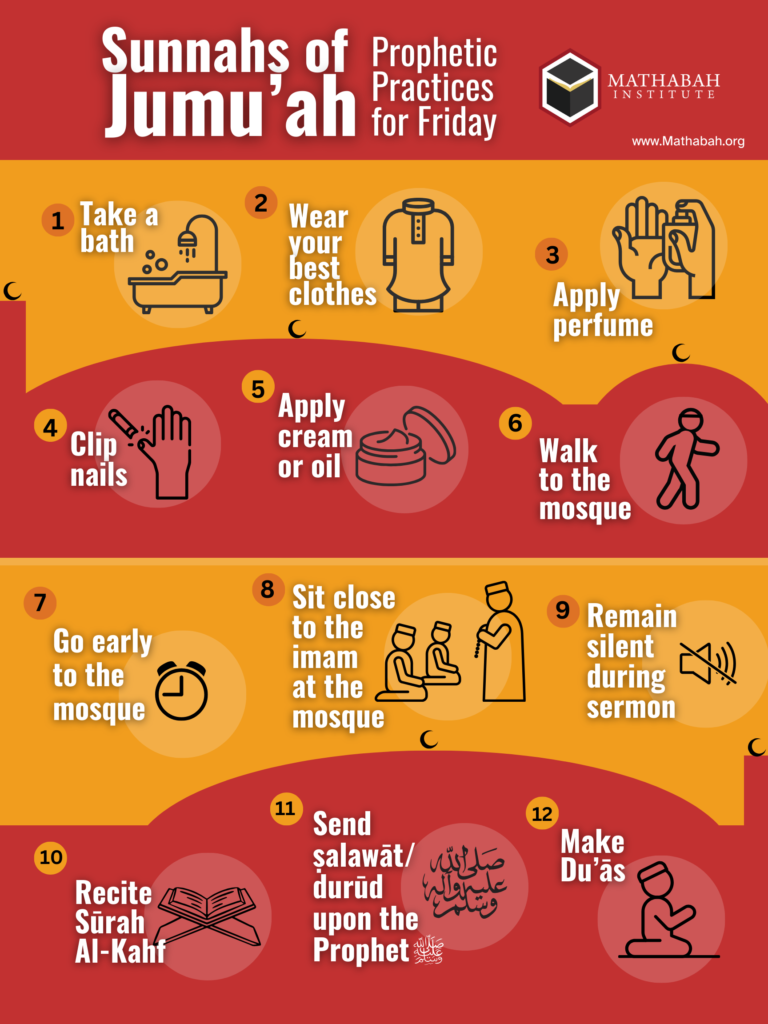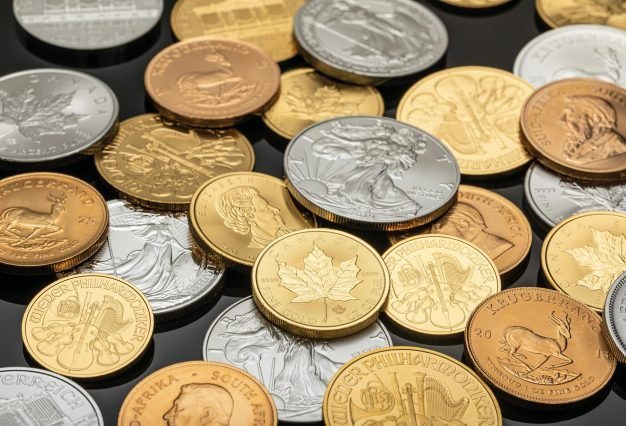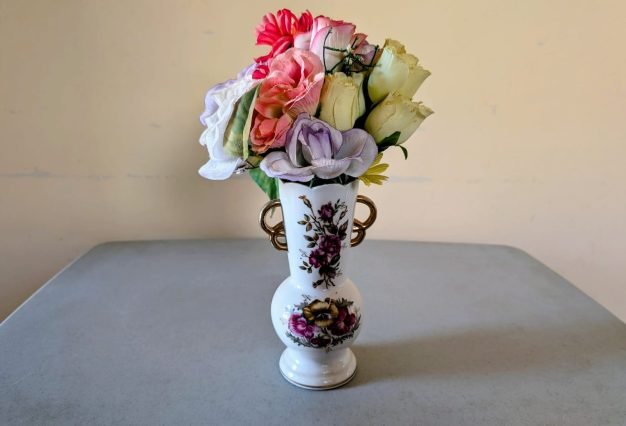By Shaykh Omar Subedar
Take a full shower or bath (ghusl) and apply some oil on your hair.
Salmān al-Farsī (may Allāh be pleased with him) reported, “The Prophet صلى الله عليه وسلم said, ‘On the day of gathering (jumuʿah), every man who bathes, cleans whatever he can of himself, applies oil […] or […] perfume […], exits his house [and after entering the masjid], does not split two people [sitting together], prays whatever is prescribed for him, and remains silent while the imām speaks — all the sins [he will commit] between [this jumuʿah] and the next jumuʿah will be forgiven.’” – (Ṣaḥīḥ al-Bukhārī 883)
Put on some nice clothes and apply perfume.
Abū Saʿīd and Abū Hurayrah (may Allāh be pleased with them) reported, “Allāh’s Messenger صلى الله عليه وسلم said, ‘On the day of jumuʿah, whoever bathes, wears his best clothes, applies perfume if he has any, comes to jumuʿah, does not step over people’s necks, prays whatever Allāh has decreed for him, and remains silent when his imām comes out [to deliver the sermon] until he completes his ṣalāh, [all these actions] will redeem him from [the sins he had committed] between this and the previous jumuʿah.’” – (Sunan Abī Dāwūd 343)
Proceed to the mosque (masjid) as early as possible.
Abū Hurayrah (may Allāh be pleased with him) reported, “The Prophet صلى الله عليه وسلم said, ‘On the day of jumuʿah, angels stand by the masjid doors, writing [the names of] the first [person to enter], then the next [and so on]. The person who leaves [his house] early is like the one who gives a sacrificial camel as a gift. Then [the next person] is like the one who gives a cow as a gift. Then, [the next one is] like [giving] a ram, then a chicken, then an egg. When the imām comes out [to deliver his sermon], they [i.e. the angels] roll up their scrolls and listen to the dhikr attentively.’” – (Ṣaḥīḥ alBukhārī 929)
If possible, walk to the masjid rather than driving.
Aws ibn Aws al-Thaqafī (may Allāh be pleased with him) reported, “I heard Allāh’s Messenger صلى الله عليه وسلم say, ‘On the day of jumuʿah, whoever causes [his wife] to need a full shower or bath (ghusl) [by sleeping with her], does ghusl himself, heads out [to the masjid] early, walks and does not ride, draws close to the imām, listens attentively [to him], and does not speak [during the sermon] will be [rewarded the equivalent of] engaging [in righteous deeds] for one year. For every single step [he takes while walking to the masjid, he will receive] the reward of fasting for one year and standing [in prayer for the nights] of one year.’” – (Sunan Abī Dāwūd 345)
Enter the masjid with your right foot and recite:
Allāhumma ftaḥ lī abwāba raḥmatik, “O Allāh, open Your doors of mercy for me.”
Anas ibn Mālik (may Allāh be pleased with him) reported, “Among the Prophet’s صلى الله عليه وسلم traditions when you enter the masjid is that you start with the right foot, and when you exit you start with the left foot.” – (Mustadrak ʿAlá al-Ṣaḥīḥayn 791)
Abū Usayd (may Allāh be pleased with him) reported, “Allāh’s Messenger صلى الله عليه وسلم said, “When any of you enter the masjid, you should say, ‘Allāh, open Your doors of mercy for me.’ When you leave, you should say, ‘Allāh, I ask You for Your grace (faḍl).’” – (Ṣaḥīḥ Muslim 1652)
Men: Sit in the first row behind the prayer leader (imām) if space is available. If not, sit as close to the front as possible.
ʿAbdullāh ibn Masʿūd (may Allāh be pleased with him) reported, “Allāh’s Messenger صلى الله عليه وسلم said, ‘Those who possess insight and intellect from among you should stay close to me, then those who are close to them, then those who are close to them […]’” – (Ṣaḥīḥ Muslim 974)
If the masjid is crowded, find the nearest available space without walking over people’s shoulders.
Abū Saʿīd and Abū Hurayrah (may Allāh be pleased with them) reported, “Allāh’s Messenger صلى الله عليه وسلم said, ‘On the day of jumuʿah, whoever bathes, wears his best clothes, applies perfume if he has any, comes to jumuʿah, does not step over people’s necks, prays whatever Allāh has decreed for him, and remains silent when his imām comes out [to deliver the sermon] until he completes his ṣalāh, [all these actions] will redeem him from [the sins he had committed] between this and the previous jumuʿah.’” – (Sunan Abī Dāwūd 343)
Abū Hurayrah (may Allāh be pleased with him) reported, “The Prophet صلى الله عليه وسلم said, ‘On the day of jumuʿah, angels stand by the masjid doors, writing [the names of] the first [person to enter], then the next [and so on]. The person who leaves [his house] early is like the one who gives a sacrificial camel as a gift. Then [the next person] is like the one who gives a cow as a gift. Then, [the next one is] like [giving] a ram, then a chicken, then an egg. When the imām comes out [to deliver his sermon], they [i.e. the angels] roll up their scrolls and listen to the dhikr attentively.’” – (Ṣaḥīḥ alBukhārī 929)
Do not squeeze between people sitting together.
Salmān al-Farsī (may Allāh be pleased with him) reported, “The Prophet صلى الله عليه وسلم said, ‘On the day of gathering (jumuʿah), every man who bathes, cleans whatever he can of himself, applies oil […] or […] perfume […], exits his house [and after entering the masjid], does not split two people [sitting together], prays whatever is prescribed for him, and remains silent while the imām speaks — all the sins [he will commit] between [this jumuʿah] and the next jumuʿah will be forgiven.’” – (Ṣaḥīḥ al-Bukhārī 883)
Perform four rakaʿāt of sunnah prayer.
ʿAbdullāh ibn al-Sāʾib (may Allāh be pleased with him) reported, “Allāh’s Messenger صلى الله عليه وسلم would perform four rakaʿāt after the sun had moved [from its zenith] before performing ẓuhr. He explained, ‘This is an hour when the doors of the sky are opened. I would like a good deed of mine to ascend through them.’” – (Jāmiʿ alTirmidhī 478)
Recite Sūrat al-Kahf while waiting for the sermon (khuṭbah) to begin.
Abū Saʿīd al-Khudrī (may Allāh be pleased with him) reported, “Allāh’s Messenger صلى الله عليه وسلم said, ‘Whoever [properly] recites Sūrat al-Kahf the way it was revealed, on the Day of Rising it will be a light (nūr) for them from their standing place to Makkah. And whoever recites its last ten verses, then [when] the false Messiah (Dajjāl) emerges, he [i.e. the Dajjāl] will not be given any power over them […]’” – (Mustadrak ʿAlá al-Ṣaḥīḥayn 2072)
Listen attentively to the khuṭbah.
Salmān al-Farsī (may Allāh be pleased with him) reported, “The Prophet صلى الله عليه وسلم said, ‘On the day of gathering (jumuʿah), every man who bathes, cleans whatever he can of himself, applies oil […] or […] perfume […], exits his house [and after entering the masjid], does not split two people [sitting together], prays whatever is prescribed for him, and remains silent while the imām speaks — all the sins [he will commit] between [this jumuʿah] and the next jumuʿah will be forgiven.’” – (Ṣaḥīḥ al-Bukhārī 883)
Make a supplication (duʿāʾ) when the imām briefly sits between the two sermons.
Abū Hurayrah (may Allāh be pleased with him) reported, “The Prophet صلى الله عليه وسلم said, “During jumuʿah, there is a moment where, if any Muslim captures it and asks Allāh for good, Allāh will give it to them.’ It is a very short moment.” – (Ṣaḥīḥ Muslim 1973)
Abū Burdah, the son of Abū Mūsá al-Ashʿarī (may Allāh be pleased with him), reported, “ʿAbdullāh ibn ʿUmar (may Allāh be pleased with him) asked me, ‘Have you heard your father report anything from Allāh’s Messenger صلى الله عليه وسلم about the moment of jumuʿah [in which supplications are accepted]?’ I replied, ‘Yes. I heard him say, ‘I heard Allāh’s Messenger صلى الله عليه وسلم say, ‘It is the moment between when the imām sits and when ṣalāh is completed.’’’” – (Ṣaḥīḥ Muslim 1975)
When forming rows, make sure each row is straight. Fill every gap between the congregants.
Jābir ibn Samurah (may Allāh be pleased with him) related, “[…] Allāh’s Messenger صلى الله عليه وسلم then emerged in front of us and said, ‘Will you not form rows the way the angels form rows by their Lord?’ So we asked, ‘Messenger of Allāh صلى الله عليه وسلم ,how do the angels form rows by their Lord?’ He replied, ‘They complete the first rows and stand close to each other.’” – (Ṣaḥīḥ Muslim 968)
Anas ibn Mālik (may Allāh be pleased with him) reported, “Allāh’s Messenger صلى الله عليه وسلم said, ‘Straighten your rows, for straightening the rows is among [the practices that] complete the prayer.’” – (Ṣaḥīḥ Muslim 975)
Once the imām begins, begin ṣalāh. Refrain from preceding him at any point during the prayer.
Abū Hurayrah (may Allāh be pleased with him) reported, “Muḥammad صلى الله عليه وسلم said, “Does the person who raises their head before the imām not fear that Allāh may transform their head into the head of a donkey?’” – (Ṣaḥīḥ Muslim 963)
When the prayer is finished, say: Allāhu Akbar
Ibn ʿAbbās (may Allāh be pleased with him) reported, “I used to recognize that Allāh’s Messenger صلى الله عليه وسلم had completed his ṣalāh with ‘Allāh is the Greatest.’” – (Ṣaḥīḥ alBukhārī 842)
After that, say astaghfiru-llāh three times followed by:
Allāhumma anta-s-salām wa minka-s-salām tabārakta dha l-jalāli wa-l-ikrām, O Allāh, You are peace, and from You is peace. You are blessed, O Possessor of Majesty and Honour.
Thawbān (may Allāh be pleased with him) reported, “When Allāh’s Messenger صلى الله عليه وسلم would conclude his prayer, he would seek forgiveness three times and would [then] say, ‘Allāh, You are peace (salām) and from You is peace. You are blessed, O Possessor of Majesty and Honour.’” (Ṣaḥīḥ Muslim 1334)
Say subḥān Allāh 33 times, then al-ḥamdu lillāh 33 times, then Allāhu akbar 34 times.
Kaʿb ibn ʿUjrah (may Allāh be pleased with him) reported, “Allāh’s Messenger صلى الله عليه وسلم said, ‘[There are certain phrases used to remember Allāh] after every obligatory prayer. Those who say them […] will not be disappointed. [They are] ‘glory be to Allāh’ (subḥān Allāh) 33 times, ‘praise be to Allāh’ (al-ḥamdu lillāh) 33 times, and ‘Allāh is the Greatest’ (Allāhu akbar) 34 times.’” – (Ṣaḥīḥ Muslim 1349)
Make a duʿāʾ to Allāh by raising your hands towards your face.Begin by praising Allāh followed by praying for the Prophet صلى الله عليه وسلم .Then request whatever you desire. Conclude by wiping your hands on our face.
Faḍālah ibn ʿUbayd (may Allāh be pleased with him) reported, “Allāh’s Messenger صلى الله عليه وسلم heard a man supplicate during ṣalāh. He neither glorified Allāh nor prayed for the Prophet صلى الله عليه وسلم . As a result, Allāh’s Messenger صلى الله عليه وسلم expressed, ‘This person was haste.’ He then called him and either said to him or to someone else, ‘When any of you supplicate, you should begin by glorifying your Lord and praising Him, and then pray for the Prophet صلى الله عليه وسلم . After that, you should ask for whatever you like.’” – (Sunan Abī Dāwūd 1481)
ʿUmar ibn al-Khaṭṭāb (may Allāh be pleased with him) related, “Whenever Allāh’s Messenger صلى الله عليه وسلم would raise his hands to supplicate, he would not put them down until he wiped his face with them.” – (Jāmiʿ al-Tirmidhī 3386)
Perform four rakaʿāt of sunnah prayer.
Abū Hurayrah (may Allāh be pleased with him) reported, “Allāh’s Messenger صلى الله عليه وسلم said, ‘When you complete the jumuʿah prayer, perform four rakaʿāt after it.’” (Sunan al-Nasaʾī 1427)
Step out of the masjid with your left foot and recite:
Allāhumma innī asʾaluka min faḍlika, O Allāh, I ask You for Your grace (faḍl).
Abū Usayd (may Allāh be pleased with him) reported, “Allāh’s Messenger صلى الله عليه وسلم said, “When any of you enter the masjid, you should say, ‘Allāh, open Your doors of mercy for me.’ When you leave, you should say, ‘Allāh, I ask You for Your grace (faḍl).’” – (Ṣaḥīḥ Muslim 1652)
Pray for the Prophet صلى الله عليه وسلم abundantly throughout the day:
Allāhumma ṣalli ʿalá Muḥammadin wa-ʿalá āli Muḥammadin wa-bārik wa-sallim. O Allāh, bless Muḥammad and the family of Muḥammad. Favour him and give him peace.
Abū Dardāʾ (may Allāh be pleased with him) reported, “Allāh’s Messenger صلى الله عليه وسلم said, Pray for me abundantly on the day of jumuʿah, for it is witnessed: the angels witness it. Whenever] anybody prays for me, their prayer is [continuously] presented to me until it is completed.’ I asked, ‘[Even] after death?’ He replied, ‘‘[Even] after death. Allāh has prohibited the earth from consuming the bodies of prophets. Allāh’s Prophet is alive [and is] being granted provisions (rizq).’” – (Sunan Ibn Mājah 1637)




